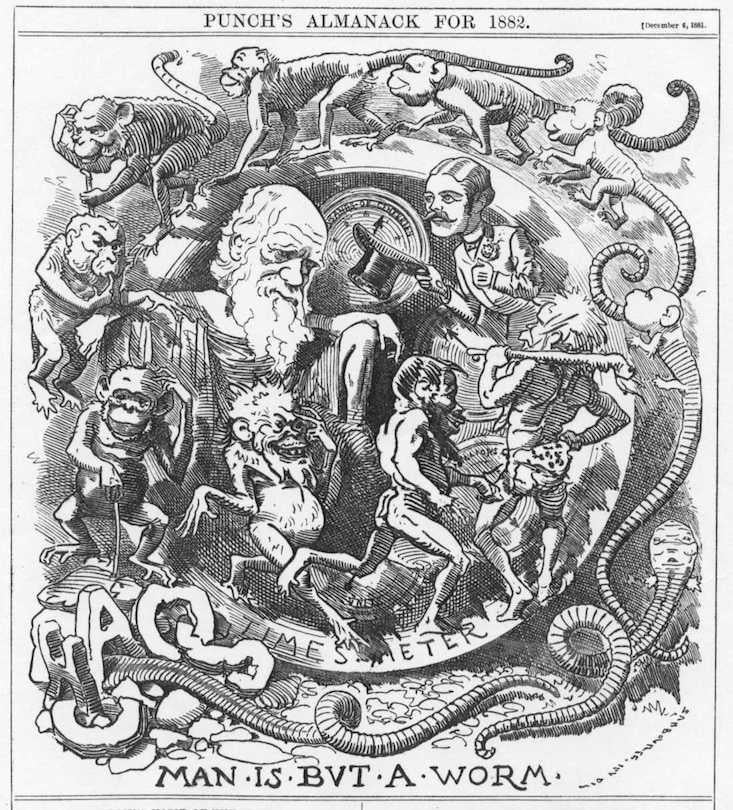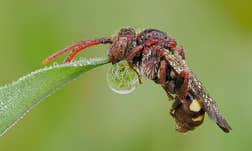One of the latest victims of Recep Tayyip Erdogan’s authoritarian regime in Turkey isn’t a journalist, or dissident academic, but the concept of evolution. His government’s decision to erase Darwin’s idea—the bedrock of biology—from the high school curriculum will take effect in September (if a lawsuit against the move fails). Classes on evolution will, for now, still be taught at the university level.
This is the apparent apotheosis of a recent trend to Islamize secular education in Turkey. References to the Muslim faith in the country’s high school curriculum have been on the rise since 2012, as have the number of Islamic schools. That year, a physics professor at Istanbul Technical University told The Atlantic that 90 percent of students there “don’t believe or don’t know evolution. But it’s worse in other universities.” Last month, the chairman of the Turkish education ministry, Alpaslan Durmuş, said, “‘Our students don’t have the necessary scientific background and information-based context needed to comprehend’ the debate about evolution.” Feray Aytekin Aydogan, who heads a union of secular-minded teachers in Turkey, told The New York Times, “The last crumbs of secular scientific education have been removed.”
This is an outcome that fundamentalist Christians have wanted to bring about in the United States at least since In His Image, a book by William Jennings Bryan, became a bestseller in the early 1920s. In a chapter titled “The Menace of Darwinism,” which was soon republished as a standalone booklet, Bryan argued that evolution could be reasonably doubted, that it shouldn’t be taught at public expense, and that it would be morally corrupting to the individual and society if accepted. These arguments helped spark the Fundamentalist-Modernist Controversy, which, according to the Encyclopedia of Religion in American Politics, pitted “theological conservatives who sought doctrinal conformity” against “liberals (or Modernists) who sought to accommodate Christianity both to modern culture and to critical and scientific thought.”
Biology teachers partly want to avoid the ire of Darwinophobic parents.
In many ways, that controversy hasn’t abated. True, creationist attempts to ban evolution in favor of a literal interpretation of Genesis have largely failed because of the Supreme Court’s adoption of the so-called “Lemon test” in 1971. This made creationism virtually impossible to constitutionally protect since, one, it doesn’t have a secular legislative purpose; two, its primary effect is to advance religion; and three, it results in excessive government entanglement with religion. Yet creationism continues to linger in public schools across the country. Why? Because it “went underground,” John E. Taylor, a professor of law at West Virginia University, wrote last month. Creationists began clamoring for “equal time” in the classroom or, at the least, disclaimers on textbooks stating that evolution is “just a theory, not fact.” A creationist rebranding, “intelligent design,” which holds that evolution was God-guided, was also advanced as a credible alternative to evolution to be discussed in class for the sake of “academic freedom.”
These tactics haven’t been entirely unsuccessful. In 2008 in Louisiana, and then in 2012 in Tennessee, laws passed allowing teachers to discuss the supposed “weaknesses” of evolutionary theory—a loophole, some science-education advocates said, through which creationism would creep in. And there’s good reason to think that it is: A 2008 nationally representative survey of U.S. high school biology teachers found that nearly half of the responders agreed or strongly agreed that creationism or intelligent design was “a valid, scientific alternative” to evolution, just over 15 percent reported adhering to young-Earth creationism, and 18 percent said they either explicitly advocated creationism in class or endorsed it in passing.

In a 2011 paper, Michael Berkman and Eric Plutzer, two of the researchers who conducted the survey, argued that the most consequential block of biology teachers may be “the cautious 60 percent”—those teachers who are strong advocates of neither evolution or creationism. Partly because they want to avoid the ire of Darwinophobic parents, and partly because they don’t fully understand evolution and the scientific method, they often don’t discuss it at all, and if they do, it’s not presented as central to biology but as something students just need to understand to pass the class. As a result, Berkman and Plutzer write, “The cautious 60 percent may play a far more important role in hindering scientific literacy in the United States than the smaller number of explicit creationists.”
How to fix this? They argue the U.S. needs its prospective biology teachers to take a course specifically on evolutionary theory—which, by the way, is “so elegant that it can be stated in five words,” writes Anne Campbell, an English ethnologist and psychologist, “random genetic variation, non-random selection.” Learning this still isn’t a requirement, perhaps because most biology teachers receive degrees from non-research institutions, Berkman and Plutzer suggest, which often don’t have the resources to provide a course on evolution. Requiring it though would, for one, provide teachers “with more confidence to teach evolution forthrightly,” they write, “even in communities where public opinion is sympathetic to creationism”; and two, it would help weed out creationists who want to teach high school biology by either converting them or encouraging them to “pursue other careers.” Reducing “the supply of teachers who are especially attractive to the most conservative school districts,” they conclude, will weaken “the cycle of ignorance.”
I, for one, was once part of it. But being convinced out of young-Earth creationism, after an undergraduate geology course, led me to entertain evolution, because the observed diversity of extinct and living lifeforms requires a vast amount of time—some four billion years—to arise. I remember accepting the truth of evolution when I had an almost visceral understanding of life’s common ancestry. Once I began to reason that what made me related to my parents was our high degree of genetic similarity, I couldn’t avoid the conclusion that, if you go “up” the family tree far enough, back hundreds of thousands of years, it begins to feature other members of the Homo genus. Keep going back six or seven million years, and you reach the last common ancestor between us and chimps, who share 98.8 percent of our DNA. With that data point in mind, it can be hard to look at a chimp and not feel a sense of kinship. I’ve convinced Christian friends wary of evolution by leading them to this thought. It may take something more imaginative, though, to relate to “Luca,” the Last Universal Common Ancestor, which, according to a 2016 study analyzing the family trees of 6.1 million protein-coding genes, is a bacterium-like organism that lived in a deep sea hydrothermal vent.
As it turns out, that mental tactic could be pedagogically effective. In a study published in May, researchers from the University of Bath, in England, found another way to help weaken the “cycle of ignorance” about evolution could be to teach genetics before evolution. “Students being taught genetics first had a 5%-10% improvement in their understanding of evolution,” they wrote, “above that shown in the group taught evolution first.” The caveat, though, was that the “genetics-first approach was no different from the evolution-first approach” in getting students to accept—rather than understand—evolution. The researchers think “what might be considered ‘authority’” gets in the way. “For students of a religious background, this appeared to be of some importance,” they wrote, “as might be expected given the prior literature on religious-based impediments to acceptance of evolution in numerous contexts.” As one student told them, “I’m religious so that’s why I kind of find it difficult.”
Sean Rice, a mathematical biologist and evolutionary theorist at Texas Tech University, thinks his state’s efforts to degrade evolution education are “deeply disturbing.” A new bill on school textbooks, signed into law last month, has at least one representative, a Houston Democrat, Alma Allen, “kind of scare[d].” She said it “allows members of the board to inject their own ideology or reject a book for other reasons.”
But Rice struck a hopeful note. He said that, at least in his own experience, he’s found that the kids who take his class as creationists seem to hold that view much more out of ignorance than religious conviction. “It’s not because they’ve thought carefully about that, and decided that’s the way they want to go,” he told us in his Ingenious interview. “It’s because they’ve never heard anything about evolution.” When he’s teaching it, he says, there’s no conflict.

Brian Gallagher is the editor of Facts So Romantic, the Nautilus blog. Follow him on Twitter @brianga11agher.


























